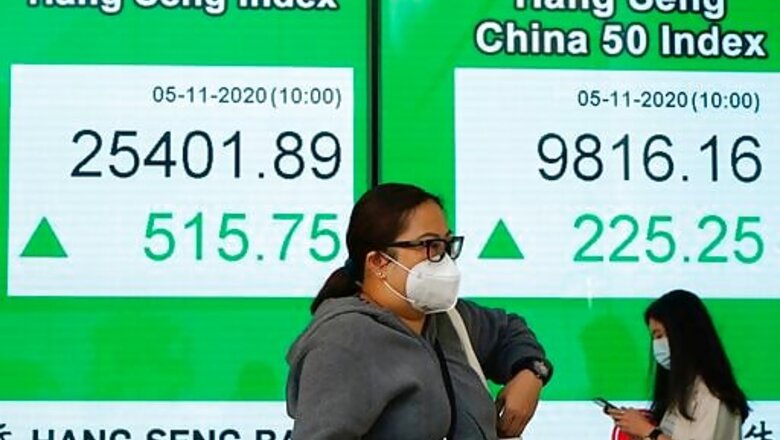
views
NEW YORK: Stocks are still riding Wall Streets post-election wave Thursday, as markets bet on the continuation of several business-friendly policies, and the S&P 500 is rallying 2.4% toward its biggest weekly jump since April.
Markets are banking on Tuesday’s election leading to split control of Congress, which could mean low tax rates, lighter regulation on businesses and other policies that investors like remain the status quo. The election still hasnt made clear who will run the White House next year, though Joe Biden is pushing closer toward the needed mark.
The S&P 500 is on pace for its fourth straight gain of more than 1%, and a 7.8% jump for the week. That would be its best week since the market was exploding out of the crater created in February and March by panic about the coronavirus pandemic.
The Dow Jones Industrial Average was up 615 points, or 2.2%, at 28,462, as of 10:22 a.m. Eastern time, and the Nasdaq composite was 2.5% higher.
Technology stocks were helping to lead the way, as they have through the pandemic and for years before that. Rising expectations that Republicans can hold onto the Senate are easing investors worries that a Democratic-controlled Washington would beef up antitrust laws and go after Big Tech more aggressively.
Apple, Microsoft, Amazon, Facebook and Googles parent company were all up between 1.8% and 3.2%. Theyre also the five biggest stock sin the S&P 500 by market value.
Broadly, markets are seeing split control of Congress as a case of what Mizuho Bank calls Goldilocks Gridlock.
An expectation that Biden has a chance of winning has also raised hopes that U.S. foreign policies might be more clear, said Jackson Wong, asset management director of Amber Hill Capital. He added, investors are cheering for that. Thats why the markets are performing well.
Stocks also climbed across European and Asian markets Thursday.
Wall Street’s rally was widespread, with more than 90% of stocks in the S&P 500 higher. Qualcomm jumped 14.1% for the biggest gain in the index after it reported stronger revenue and profit for the latest quarter than analysts expected.
Still, many analysts warn some volatility may still lie ahead. Big swings could return as the threat of a contested, drawn-out election still looms.
President Donald Trumps campaign has filed legal challenges in some key swing states, though its unclear whether they can shift the race in his favor. A long court battle without a clear winner of the presidency could raise uncertainty for markets and drag down stocks, analysts say.
Split control of Washington also carries downsides that markets may not yet be fully appreciating. Gridlock may lessen the chances of the U.S. government coming together on a deal to deliver a big shot of stimulus for the economy.
Thats something investors and economists have been asking for since the last round of benefits for laid-off workers and other benefits expired. A report on Thursday showed that more workers filed for unemployment last week than economists expected, though the number was slightly better than the week before.
Investors are still hoping Washington can agree on more stimulus for the economy, though they say it likely wont be as big as it could have been following a Democratic sweep.
If Congress and the White House cant come to a deal, the pressure rises on the Federal Reserve to do more to support the economy, if it can. The central bank has already slashed interest rates to record lows and stepped forcefully into the bond market to prop up prices.
It will announce its latest decision on interest-rate policy in the afternoon. Investors don’t expect it to make any major changes, and it will likely wait before potentially strengthening its bond-buying program.
The yield on the 10-year Treasury held steady at 0.77%. It had been above 0.90% earlier this week, when markets were still thinking a Democratic sweep was possible that could lead to a big stimulus package for the economy.
The pandemic continues to weigh on economies around the world, with counts rising at particularly troubling rates across much of Europe and the United States. Several European governments have brought back restrictions on businesses in hopes of slowing the spread.
In the U.S., even if the strictest lockdowns from the spring dont return, the worry is that the worsening pandemic could change consumers behavior enough on its own to undercut companies profits.
In London, the FTSE 100 rose 0.6% as England began a four-week lockdown that will keep closed all shops selling items deemed to be non-essential, such as books and clothes. Scotland, Wales and Northern Ireland also have announced wide-ranging restrictions on economic activity.
The Bank of England increased its monetary stimulus by more than expected to help the economy weather the new lockdown measures.
In Paris, the CAC 40 gained 1.2%, while Germanys DAX returned 1.8%.
In Asia, Hong Kongs Hang Seng gained 3.3%, Tokyos Nikkei 225 climbed 1.7%, South Koreas Kospi rose 2.4% and stocks in Shanghai added 1.3%.
___
AP Business Writer Elaine Kurtenbach contributed.
Disclaimer: This post has been auto-published from an agency feed without any modifications to the text and has not been reviewed by an editor
Read all the Latest News, Breaking News and Coronavirus News here



















Comments
0 comment